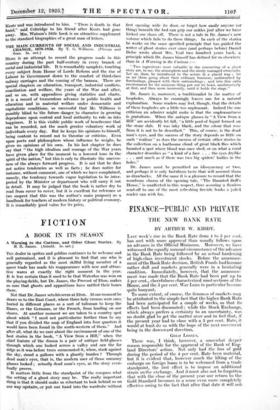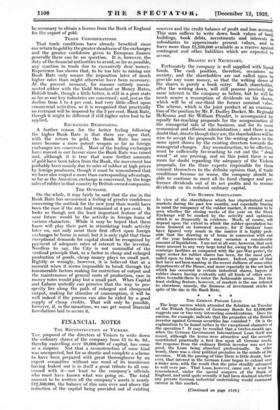FINANCE-PUBLIC AND PRIVATE
THE NEW BANK RATE
BY ARTHUR W. KIDDY.
LAST week's rise in the Bank Rate from 4 to 5 per cent. has met with more approval than usually follows upon an advance in the Official Minimum. Moreover, we have witnessed the equally unusual circumstance of the advance in the Bank Rate being followed by an-actual hardenifik of high-class investment stocks. Befdre the announce- ment of the Bank Rate decision, British Funds had become rather dull and markets generally were in a hiSitati4 condition. Immediately, however, that the announce- ment Was made that the Bank Rate had been put" up to 5 per cent., cheerfulness characterized niost sections. of the House, and the 5 per cent. War Loan in particular become quite buoyant. To some extent, of course, the firmness of markets may be attributed to the simple fact that the higher Bank Rate had been anticipated for a • couple of weeks, so that its -effects had heed discounted ; while the Stock Exchange, which always prefers a certainty to an uncertainty, was no doubt glad to get the matter over and to feel that, if the present year had to close with a 5 per cent. Rate, it would at least do so with the hope of the next movement being in the downward direction.
GOLD LOSSES.
There was, I think, however, a somewhat deeper reason responsible for the approval of the Bank of Eng- land Directors' action. Not only had the loss of gold during the period of the 4 per cent. Rate been material, but it is evident that, however much the lifting of the embargo on foreign loans is to be welcomed from a trade standpoint, the first effect is to impose an additional strain on the exchange. And it must also not be forgotten that with the close of the present year our return to the Gold Standard becomes in a sense even more completely :effective owing to the fact that after that date it will -not- be necessary to obtain a licence from the Bank of England for the export of gold.
TRADE CONSIDERATIONS.
That trade conditions have already benefited since our return to gold by the greater steadiness of the exchanges and the greater confidence given to European finance generally there can be no question. It is, however, the duty of the financial authorities to avoid, as far as possible, any reaction in trade due to excessively dear money. Experience has shown that, to be too late in raising our Bank Rate only means the imposition later of .much higher rates than might otherwise have been necessary. At the present moment, for reasons entirely uncon- nected either with the Gold. Standard or Money. Rates, British trade, though a little better, is still in a poor state so far as our key industries are concerned; and, just as the decline from 5 to 4 per cent. had very little effect upon commercial activities, so it is recognized that practically no restraint will be imposed by the 5 per cent. Bank Rate, though it might be different if still higher rates had to be applied. EXCHANGES RESPONDING.
A further reason for the better feeling following the higher Bank Rate is that there are signs that, With the return to gold, the Bank Rate has once more become a more potent weapon so far as foreign exchanges are concerned. Most of the leading exchanges have moved in our favour since the Bank Rate was raised and, although it is true that some further amounts Of gold have been taken from the Bank, the movement haS probably been mainly due to sales of rubber at high prices by foreign producers, though it must be remembered that we have also reaped a more than corresponding advantage, so far as the American exchange is concerned, by the huge sales of rubber to that country by British-owned companies.
THE OUTLOOK.
On the whole, it may fairly be said that the rise in the Bank Rate has occasioned a feeling of greater confidence concerning the outlook for the new year than would have been the case if the rate had remained at 4 per cent. It looks as though not the least important feature of the near future would be the activity in foreign loans of various characters. While it may be hoped that these loans will play their part in stimulating trade activity later on, not. only must their first effect upon foreign exchanges be borne in mind, but it is only right that these exceptional demands for capital should be recognized by payment of adequate rates of interest to the investor. Needless to say, the City is not unmindful of the cardinal principle that, as a factor in cheap and enlarged production of goods, cheap money plays no small part. Rightly or wrongly, however, it is believed that at a moment when it seems impossible to break through the innumerable factors making for restriction of output and the maintenance of general costs of production, ease in money rates would play but a small part. When Capital and Labour unitedly can perceive that the way to pro- sperity lies along the path of enlarged and cheapened output, making for stimulus of consumption, it will be well indeed if the process can also be aided by a good supply of cheap credits. That will only be possible, however, if, in the meantime, we can get sound financial foundations laid to secure it.























































 Previous page
Previous page